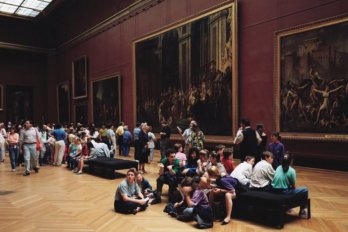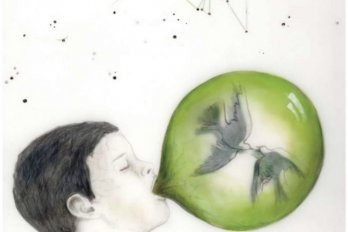abidjan—The crumbling Hôtel Ivoire, perched on the banks of a now-swampy lagoon, stands as a cruel reminder of what Ivory Coast once was. The formerly grand hallways are shabby, the fancy boutiques depleted of foreign goods, and the massive multi-tiered swimming pool is dry. The casino is still open, as are some of the eleven tennis courts, but West Africa’s only skating rink—once kept smooth and cool even when temperatures soared into the 40s is closed. Built in 1960 during the rule of Félix Houphouët-Boigny, the father of Ivorian independence, the hotel is now a symbol of dashed dreams.
I am in the lobby, waiting at the Café Boulevard to meet Charles Blé Goudé, the founding director of the Young Patriots, a brash, violent youth gang whose members resent that the “Ivorian Miracle” Houphouët-Boigny’s celebrated economic vision for the former French colony in the 1960s and 70s didn’t last long enough to make their generation wealthy. Goudé is the swaggering, thirtysomething champion of the movement, which claims tens of thousands of young, militant supporters and heavy influence on Ivory Coast’s president, Laurent Gbagbo. The chatter among diplomats is that Goudé lives at the Hôtel Ivoire and his expenses, which include an unofficial “salary” of some $80,000 (US) per month, are paid for by the president’s office.
A few days earlier, I had seen a Young Patriots’ rally and found it alarming. Several hundred young men were assembled in a soccer field, wearing track suits and gold chains in emulation of the American hip-hop movement. The testosterone was palpable as the rally’s leaders addressed the crowd with megaphones, chanting slogans denouncing the “foreigners” they accuse of stealing their jobs. The youth at the rally, who make up the Young Patriots’ militias, have been exporting this zeal to the streets of Abidjan, where they have been ambushing the few French citizens with the folly to remain, and to the surrounding countryside, where they have been attacking the farmers from Mali and Burkina Faso who produce Ivory Coast’s main commodity, cocoa.
The Young Patriots are agents of Gbagbo’s desperate strategy to cling to power using the blunt tool of ethnic nationalism. The concept of ivoirité, which professes that only those of pure Ivorian blood should have any rights, is wildly popular in Abidjan and the rest of the Christian-dominated south, where Gbagbo’s support is based, and where violent attacks on non-Ivoirians go unpunished. This blaming of “the other” has had serious consequences since ivoirité’s birth in 1994, most recently the near-destruction of the country in 2002, when the Muslim-dominated north launched a civil war against the south. Gbagbo has signed peace agreements with the rebels, but his security forces are carrying on an open campaign of violence and intimidation, and he continues to encourage the fascistic Young Patriots and other militias to do more of his dirty work.
The Patriots’ leader—a small, smiling Eddie Murphy look-alike wearing a Nike ball cap and a loose denim shirt—strolls through the Hôtel Ivoire lobby to greet me. The General, as Goudé is known, apologizes for being late, then is immediately distracted by a bevy of swooning young women who want to touch him. A male supporter fist-bumps him, then declares to me, in the only English words he seems to know, “He da man.” (Young Ivorians love American black culture, even if much of what they imitate no longer exists outside of Saturday Night Live parodies. They were disappointed the US didn’t invade Ivory Coast to fight the Muslims in the north and are great admirers of George Bush because they believe he hates France as much as they do.)
Goudé appears to have arrived alone, but when I suggest we move to a quieter corner, the lobby seems to move with us. I notice the bodyguards, strategically placed and carrying Kalashnikovs, and feel the true menace of the man. “We have to take control of our affairs—become masters in our own house,” he tells me calmly. “You would not allow outsiders to run your country, would you?” He scoffs at suggestions of xenophobia, claiming all foreigners are welcome in Ivory Coast except for the French and the terrorists (a conveniently flexible term that refers mainly to the rebels but can include anyone not covered by ivoirité).
The General tells me the Young Patriots are modelled on the American Black Power movement of the 1960s: dedicated to peaceful activism and self-determination. I point out that the Black Power movement spawned the Black Panthers, who advocated violence, but he sees no contradiction. “What we learn from them is how to present the image of peaceful rebellion while armed resistance works underground,” he explains, in a unique perversion of identity politics. What about the Young Patriot death squads that murder people in the countryside and trash newspaper offices? I ask. Exaggerations, he tells me, or acts perpetrated by the French to make him look bad. The forced evictions from cocoa farms? People are simply leaving the land because it isn’t theirs, he says with a smile.
After we’ve finished our French croissants and Italian coffee, Charles pops the question. Will I come to work for him? I figure this must be a joke, but a man in a suit, who appears to have styled himself after Malcolm X, suddenly joins us, as if on cue, to repeat the offer. “We need someone to help us with our image,” he says. The General puts his hand on my arm. “We need a spin doctor. Someone like yourself who can explain our position.” He doesn’t elaborate, but I presume that he believes a white Canadian woman would be a good foil for his hate-filled campaigns. He complains that he gets too much bad press and the movement needs PR. “We want to expand outside of Côte d’Ivoire,” he says. “Become pan-African.”
In my mind, I’m running through some of the General’s recent remarks to the media, including a statement in which he said he did not believe Hitler and Milosevic were evil—that, like him, they had been misrepresented in the media and misunderstood by the world. An army of spin doctors could not save Charles Blé Goudé from himself. But I tell him I will think about his offer.
I flee the café, feeling nauseous. The General, too, departs, followed by what appears to be everyone in the lobby. I realize with a cold shudder that the world will come to know him well as he helps sink Ivory Coast into the same hole that Liberia and Sierra Leone to the west have already descended into. Elections scheduled for October are certain to be postponed, and rebels in the north have refused to disarm. These people have cause to fear: ngos are reporting that the country is chockablock with illegal guns. No one knows who is stockpiling them, or for what dark purpose, but observers suspect, with good reason, that the weapons caches are for the youth militias.






